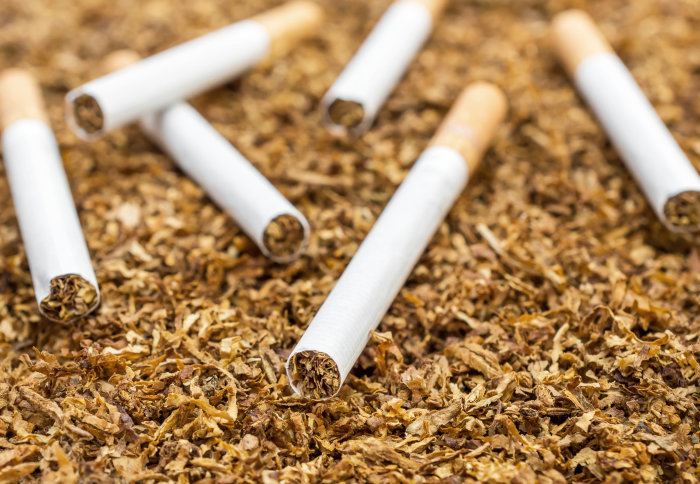Public health experts have consistently warned that the dearth in funding for enforcement of the National Tobacco Control (NTC) Act 2015 may be exploited by the tobacco industry to deepen their reach in the Nigerian market.
Recently, tobacco control activists in Lagos raised the alarm about the influx of new tobacco products without the mandatory Graphic Health Warnings (GHWs), which the Federal Government introduced in 2021.
These health warnings were introduced as a crucial component of the NTC Act of 2015 and the subsequent National Tobacco Control Regulations of 2019. The urgency of the situation is further underscored by the Act's stipulation for a periodic review of these warnings every two years, a measure aimed at ensuring their continued relevance and effectiveness.
Currently, the new graphic health warnings prominently display the grim message; Smoking Causes
Mouth Cancer; accompanied by a distressing image illustrating the effects of this devastating disease. In contrast, the previous warning only stated: The Ministry of Health warns that smokers are liable to die young; and no graphic displays.
Monitoring activities by tobacco control activists show that some local companies marketing tobacco accessories still display and sell products without the prescribed graphic warnings, openly flouting the NTC Act of 2015 and its Regulations. This breach of regulatory requirements raises significant concerns about the effectiveness of measures designed to safeguard public health.
Pundits have warned over time that the paucity of funds for agencies of government such as the Federal Competition; Consumer Protection Commission (FCCPC), the Nigeria Police and the Nigeria Security and Civil Defence Corps (NSCDC) to carry out enforcement activities simultaneously across the country may hamper the fight against tobacco use and addiction.
Addressing this issue effectively demands a multifaceted approach that includes not only regulatory compliance but also the allocation of adequate resources to enforcement agencies. Only through such concerted efforts can we hope to confront an industry determined to market lethal products.
The 2023 Appropriation Act has earmarked a sum of ₦4.7 million for the implementation of the NTC Act of 2015 and its accompanying Regulations of 2019. While this allocation is certainly a commendable step taken by the Nigerian government in the battle against tobacco and related issues, it falls woefully short when measured against the magnitude of the task at hand.
The budgetary provision, though a positive gesture, pales in comparison to the resources required for a comprehensive and effective execution of tobacco control initiatives in Nigeria. An example of the challenges faced in the enforcement of GHW. These activities gulp substantial resources.
Unfortunately, the tobacco industry sees this lacuna as an opportunity. Due to funding limitations, various government agencies and ministries are increasingly compelled to enter partnerships with tobacco companies that possess considerable financial resources to throw cheaply around in implementing their activities.
This collaboration with the industry raises concerns about potential conflicts of interest and underscores the pressing need for more substantial financial backing to safeguard public health effectively.
Section 8 of the NTC Act of 2015 establishes a pivotal mechanism known as the Tobacco Control Fund, which serves as a financial reservoir to bolster the efforts of government agencies engaged in tobacco control efforts within Nigeria. This fund is strategically designed to facilitate the financing of various activities undertaken by these agencies, with the overarching goal of ensuring effective tobacco control measures throughout the country.
As outlined in the Act, the sources contributing to this fund are diverse and include annual budgetary allocations, financial assistance from both Federal and State Governments, contributions from entities that align with the objectives of the Act through gifts, donations and testamentary dispositions, as well as licensing fees collected from tobacco manufacturers, importers, and distributors.
Read also: Climate justice groups carpet IOCs over divestments in Africa
The advantages and utility of the Tobacco Control Fund extend beyond mere financial support. It offers a dedicated and protected source of funding, specifically earmarked for critical programs and activities. An additional and significant advantage is the reduced dependence on external donor funding, providing a more sustainable approach to tobacco control efforts.
The allocation of these funds caters to a broad spectrum of essential activities, including the enforcement of the provisions stipulated in the NTC Act 2015, the training of enforcement agents, and raising awareness about tobacco harm through comprehensive campaigns. Furthermore, resources can be channeled towards vital services such as cessation services, which are instrumental in supporting individuals seeking to quit tobacco use.
Additionally, the fund can contribute to research focused on alternate cropping methods that promote both health and environmentally friendly practices among farmers.
It could also come useful in the monitoring and evaluation of tobacco control activities, ensuring accountability and the continued effectiveness of these efforts. In sum, the Tobacco Control Fund stands as a crucial instrument in the pursuit of comprehensive tobacco control strategies within Nigeria, with its potential to positively impact public health and reduce the burden of tobacco-related diseases. Unfortunately, the government has yet to tap the wealth of opportunity the Fund will open.
The Federal Government has a critical opportunity at hand to invest in the well-being of its citizens by taking decisive action in the realm of tobacco control. With every passing day, the risk of more lives being claimed by tobacco and tobacco-related ailments looms large.
It is, therefore, incumbent on the Nigerian government to act swiftly and decisively by increasing the budgetary allocation for tobacco control in the 2024 national budget.
This decision carries not only financial implications but also a profound moral duty to protect the health and future of the nation. Any delay in this vital step could tragically result in the loss of more lives, a scenario that can and must be prevented through prompt and adequate funding.
Fatuase, a staff of the Corporate Accountability and Public Participation Africa, writes from Lagos





